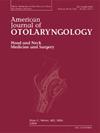Efficacy of auricular vagus nerve stimulation for globus pharyngeus: A prospective pilot study
IF 1.7
4区 医学
Q2 OTORHINOLARYNGOLOGY
引用次数: 0
Abstract
Purpose
Globus pharyngeus (persistent “lump in the throat” sensation) is a common, often benign condition with unclear etiology and limited treatment options. This study aimed to evaluate the efficacy of transcutaneous auricular vagus nerve stimulation (taVNS) in reducing globus symptoms in affected patients.
Methods
We conducted a prospective single-arm trial at a tertiary care center. Adult patients with GP received taVNS therapy once daily for 30 min over a two-week period. Stimulation was delivered via an electrode placed on the auricular branch of the vagus nerve. Symptom severity was assessed using the Laryngopharyngeal Measure of Perceived Sensation (LUMP) questionnaire. Anxiety and depression were assessed using the Self-Rating Anxiety Scale (SAS) and the Self-Rating Depression Scale (SDS). Pre- and post-treatment scores were compared using paired nonparametric or t-tests, as appropriate. Subgroup analyses were conducted in patients with baseline anxiety or depression, defined as a SAS or SDS score ≥ 50.
Results
A total of 35 patients completed the trial (mean age 51.4 ± 10.9 years), of whom 28 (80 %) were female. All patients tolerated the taVNS protocol well, and no serious adverse effects were reported. There was a significant reduction in globus symptom severity following treatment: the median LUMP score decreased from 10 (IQR 7.5–15) at baseline to 5 (IQR 3–9) post-treatment (p < 0.001). Mean anxiety and depression scores also decreased (SAS: 46.0 ± 8.4 to 43.0 ± 7.7, p = 0.002; SDS: 49.5 ± 11.7 to 44.7 ± 9.4, p = 0.005). Subgroup analyses indicated that mood-related improvements were confined to participants with baseline anxiety (−5.6 points; p = 0.008) or depression (−9.3 points; p = 0.001), while no significant changes were observed in those without baseline emotional symptoms.
Conclusion
taVNS significantly reduced globus pharyngeus symptoms and improved anxiety and depression scores, especially in patients with baseline emotional distress. These findings support the potential of taVNS as a well-tolerated neuromodulation approach for managing globus and warrant further validation in controlled trials.
耳迷走神经刺激对咽球的疗效:一项前瞻性先导研究
目的咽球症(持续的“喉咙肿块”感)是一种常见的良性疾病,病因不明,治疗方法有限。本研究旨在评估经皮耳迷走神经刺激(taVNS)减轻受累患者的球症状的疗效。方法:我们在一家三级保健中心进行了一项前瞻性单臂试验。成年GP患者接受taVNS治疗,每天一次,持续30分钟,为期两周。刺激是通过放置在迷走神经耳支上的电极传递的。使用喉咽知觉测量(肿块)问卷评估症状严重程度。采用焦虑自评量表(SAS)和抑郁自评量表(SDS)对焦虑和抑郁进行评估。治疗前后的评分采用配对非参数检验或t检验进行比较。对基线焦虑或抑郁患者进行亚组分析,定义为SAS或SDS评分≥50。结果共35例患者完成试验,平均年龄51.4±10.9岁,其中女性28例(80%)。所有患者对taVNS方案耐受良好,无严重不良反应报告。治疗后,全球症状严重程度显著降低:治疗后的中位肿块评分从基线时的10分(IQR 7.5-15)降至5分(IQR 3-9) (p <;0.001)。平均焦虑和抑郁评分也下降(SAS: 46.0±8.4至43.0±7.7,p = 0.002;SDS: 49.5±11.7 ~ 44.7±9.4,p = 0.005)。亚组分析表明,情绪相关的改善仅限于基线焦虑的参与者(- 5.6分;P = 0.008)或抑郁(- 9.3分;P = 0.001),而在没有基线情绪症状的患者中没有观察到显著变化。结论avns可显著减轻咽球症状,改善焦虑和抑郁评分,尤其是基线情绪困扰患者。这些发现支持taVNS作为一种耐受性良好的神经调节方法来管理球体的潜力,并需要在对照试验中进一步验证。
本文章由计算机程序翻译,如有差异,请以英文原文为准。
求助全文
约1分钟内获得全文
求助全文
来源期刊

American Journal of Otolaryngology
医学-耳鼻喉科学
CiteScore
4.40
自引率
4.00%
发文量
378
审稿时长
41 days
期刊介绍:
Be fully informed about developments in otology, neurotology, audiology, rhinology, allergy, laryngology, speech science, bronchoesophagology, facial plastic surgery, and head and neck surgery. Featured sections include original contributions, grand rounds, current reviews, case reports and socioeconomics.
 求助内容:
求助内容: 应助结果提醒方式:
应助结果提醒方式:


